Like a lot of people who play this game, I like statistics.
Now, of course, statistics are a tricky thing. Mark Twain once said:
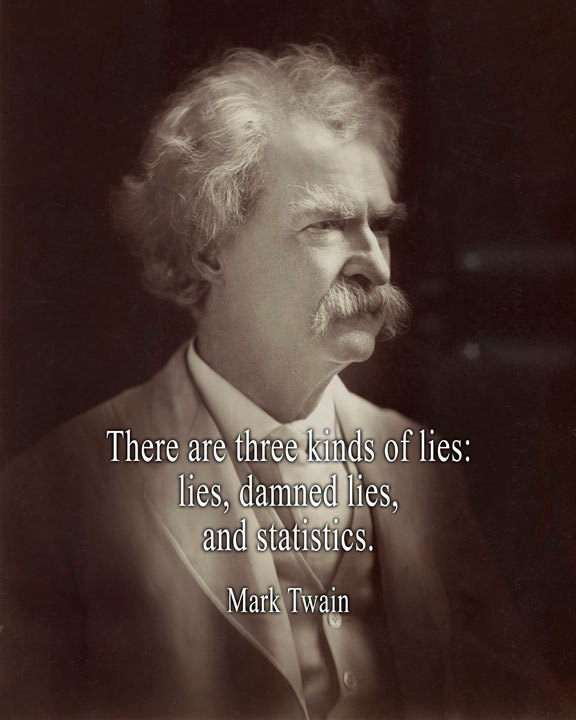
This is one of those quotable gems that is so easy to understand if you’ve ever played with stats. Do you want to make someone look good? Choose your stats. Make them look bad? The same.
In Magic, we even regularly make up statistics. “Abzan Megamorph is 60% against Abzan Aggro.”
Is it?
Or is it more accurate to say that Jim’s Abzan Megamorph played by Jim himself, went 6-4 in Game Ones against Bettie’s Abzan Aggro played by Arya.
Regardless of the problematic nature of trying to measure reality, properly employed, it is still better than shooting in the dark or mere guesswork. Do you want to know who the most successful players ever on the Pro Tour were? There is a good argument to be made that it is easily Jon Finkel and Kai Budde. Third place becomes an argument depending on your metrics. Do you want to know who the best players ever on the Pro Tour were? Again, people will go with Jon and Kai, but they are far more likely to disagree on who was “better,” and third place will vary much, much more wildly than the answer to the previous question. Even though I think that the correct answer is Bob Maher, the truth of the matter is that statistics alone are not enough for us to answer the question.
But they can help.
Constellations In The Sky
If statistics can’t strictly tell us from up high “who is the best,” what good are they?
They can provide a framework.
In literary theory, one older idea about a text is that there is an objective, authoritative meaning to, say, a book. A newer theory, put forth by academics like Stanley Fish, is that instead meaning can be obtained from the collective understand of a community. One meaning is better than another because more people can understand and agree with it. The Lord of the Rings isn’t “A heartwarming story of a boy and his dog,” but maybe it is an allegory to the horrors of war during the World War II. And even if it is an allegory, you don’t need to know that to potentially enjoy it. The meaning of the book can be different for different people, still be meaningful to all of them, and yet we can still say that there are some interpretations that are better because more people can understand them.
When we’re looking at the night sky, and I point out the constellation for The Archer (Sagittarius), if you know the stars, you too could see it. Or, perhaps, looking at the same sky, you’d say, “Aha, but look! The Great Spider!”
Pointing out the stars, you could trace the spider, and perhaps I, too, could see it. In response, maybe I’d point out “The Happy Smiler,” a constellation that made a happy face.
But neither of us could see any constellation if the specific stars weren’t there for us to draw the lines with.
We need something to work with.
So it is with examining the Magic The Gathering Hall of Fame.
Each of the players who are up for membership in the Hall of Fame are notable Magic players. Tomohiro Kaji, the player with the least number of PT Points nominated for the Hall of Fame, is a Grand Prix and Pro Tour Champion. I don’t know if Kaji will make many ballots this year, but the fact remains: all of these players are stars of the game, though some people certainly burn brighter to our eyes than to others.
This year everyone’s opinion matters more than ever.
This year, the community gets a #mtghof vote! More details: http://t.co/i67JytiytW
— Mike Rosenberg (@rosenbergmike) July 7, 2015
This is not a small thing.
People have missed the Hall of Fame by a single vote. People have made the Hall of Fame by a single vote.
Different Communities
The Hall of Fame means different things to different people. There are people who’ve been inducted into the Hall of Fame that I’m sure you don’t think should be in there. There are people who have been inducted in the Hall of Fame that I don’t think should be in there.
But the Hall of Fame is bigger than any individual person’s idea of what it is. The guidelines to join the Hall are supposed to be this:
- Player’s performance
- Playing ability
- Integrity
- Sportsmanship
- Contributions to the game in general
How we weigh this, what these things mean – that is very different from person-to-person. What is important is that every ballot chooses to measure these things seriously, and with respect for the game.
About the only time I dislike a ballot is when someone just votes for their Pro Tour friends and leaves it at that. This has become less and less of a problem as people have come to take the Hall of Fame more seriously.
The honest differences in ballots are a good thing. Simply put, the Magic: the Gathering Pro Tour is a different thing to everyone. No one’s PT is the same as another person’s PT, whether they are a spectator, a player, a judge, or an official. Some of us might have fairly similar values, but even if we might happen to choose the exact same ballot, we still experience the PT differently.
For me, I greatly value all of those criteria, but I have some specific ideas of what it means to be in the Hall of Fame that are hard and fast. If you’re a cheater, for example, you won’t get my vote. Someone else’s hard lines might not be mine, but altogether, the amalgamation of all of our values is the Pro Tour. It is our Pro Tour.
And Now, Some Starting Stats
There are currently 39 members of the Magic The Gathering Pro Tour Hall of Fame and there are 40 current nominees.
I put together a spreadsheet with all of the Hall of Fame data – for members and nominees – on my Facebook page, carefully preserving the data on any member that they had at the time their ballot was sent out for a vote. In other words, the stats you see for Jon Finkel are the stats that were sent out on the ballot where he was voted in.
Of course, there was a lot of missing data. Filling in the blanks, I added in things like Pro Tour Wins, Masters data, Worlds Team wins, Nationals wins, and more. To me, all of these things could help someone understand who someone is, and the best picture of them as a player that numbers can provide.
The document includes the following stats:
- Year inducted into the Hall of Fame
- Weighted Ballot (%) – i.e., how many ballots a member received when inducted
- Number of Pro Tours and Pro Tour Points
- Median and 3-year Median finishes
- Player of the Year / Rookie of the Year / Player of the Year Top 10 counts
- Pro Tour Wins / Top 8s / Top 16s/ Top 32s / Top 64s
- Grand Prix Wins / Top 8s
- Other major finishes (World Magic Cup, The Masters, World Team Wins, Nationals Wins, National Team Memberships)
There is more I could have potentially gathered. Unfortunately, so much of this information is scattered all over the place. I’ve generally tried to compile this data before for previous votes, but this year I decided it was worth the effort to finally collect it all somewhere.
Grouping Candidates
In addition, I created three imaginary Pro Tour players, “High Median,” “Middle Median,” and “Low Median,” each representing the dead center of the top, middle, and lower third of the inducted Hall of Fame. In a sense you could think of these as an “excellent Hall of Fame member,” a “solid Hall of Fame member,” and a “borderline Hall of Fame member.”
An excellent candidate will have about two Pro Tour championships, six PT Top 8s, seventeen PT Top 32s, a peak performance median of around 28th place, have been in the Player of the Year Top 10 four times (winning it once), and have several other accomplishments.
A solid candidate will have about one Pro Tour championship, five PT Top 8s, twelve PT Top 32s, a peak performance median of 42nd place, have been in the Player of the Year Top 10 twice, and have a few other accomplishments.
A borderline candidate will have no Pro Tour championships, three PT Top 8s, ten PT Top 32s, a peak performance median of 57th place, and few to no other accomplishments.
This doesn’t, of course, cover everything perfectly. Steven O’Mahoney-Schwartz is, by most statistical measurements, a borderline candidate. However, to me, Steve OMS was a home-run candidate and I was happy to vote for him. While he ‘only’ had one win and three Top 8s, he was not only probably the best player in the world at Rochester Draft, but he was also the player who really first started out pursuing the modern ‘Pro Tour lifestyle,’ regularly traveling very far to Grand Prix well before it was something most people thought to do.
Now, not all of the measures I’ve collected are ones I value. I’m not so concerned about the number of Pro Tour Points they’ve accumulated. If those are stats you care about, I welcome you to go look at those stats, and others.
In the following groups, I’m going to separate nominees into players clustered near High Median (Hall of Fame members marked in dark blue), and Middle Median (Hall of Fame members marked in blue); stats that appear in light blue are Low Median Hall of Fame stats. Nominees are in white cells.
Median And Three-Year Median Finish
For a lot of people, these two stats are big ones. While not universally accepted as valuable, the Median finish is seen as a common measure of skill, while the 3-year Median is seen as a way to mark the time a player was at their peak. Common critiques of this, though, are that the Median finish punishes players who continue to play the game even if they can’t dedicate time to it, and the 3-year Median is an unrealistic way to measure peak performance (indeed, some people’s “peak” performance is lower than their career median).
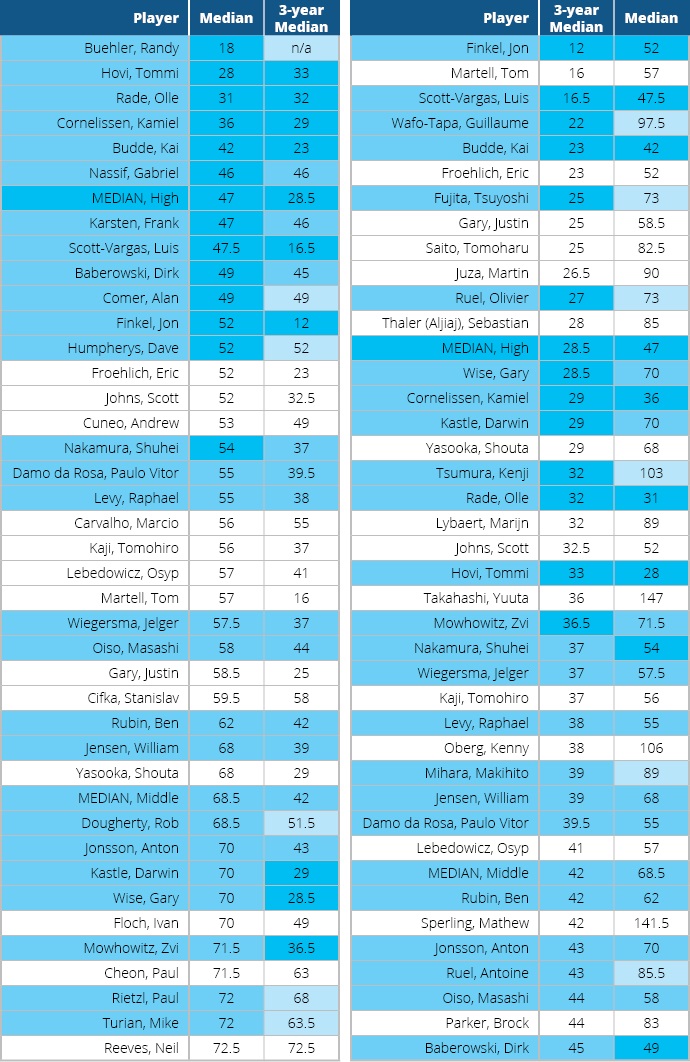
Some clear standouts here are the players who excel at both marks:
Eric Froehlich
Tom Martell
Justin Gary
Scott Johns
I think it is easy to make the claim that each of these players were especially noteworthy in their Pro Tour finishes.
Player Of The Year / Rookie Of The Year / Player Of The Year Race
Another thing that a lot of people use as a measurement of playskill is how often that they were in the Player of the Year race. You can see how things break down:
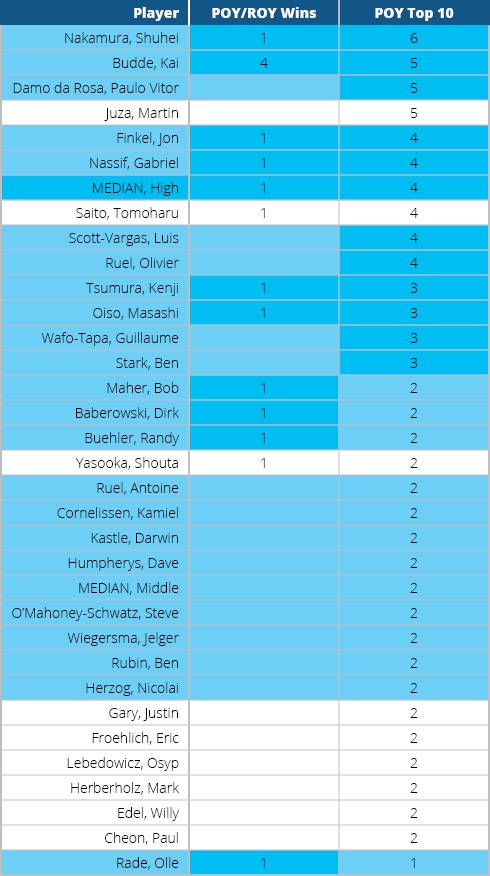
Martin Juza has the most times he’s been in the running, but only Tomoharu Saito and Shouta Yasooka have an actual win. Aside from that, there are a large pack of players all of whom have been in the running twice.
Pro Tour Wins / Top 8 / Top 16 / Top 32 / Top 64
If you count players on the ballot with a Pro Tour win, you have a pretty long list, actually:
Stanislav Cifka, Ivan Floch, Justin Gary, Mark Herberholz, Scott Johns, Tomohiro Kaji, Osyp Lebedowicz, Tom Martell, Kazuya Mitamura, Brock Parker, Tomoharu Saito, David Sharfman, Craig Wescoe, and Shouta Yasooka. That’s fourteen players. While I don’t necessarily need a player to be a Pro Tour Champion to consider voting for them (though if they aren’t, I want them to be a Champion of something bigger than a Grand Prix), that is a sticking point for some people.
Often, though, people look at Top 8, Top 16, Top 32, and Top 64 performances as a way to guide them
Here are players at the top end of Top 8 performances:
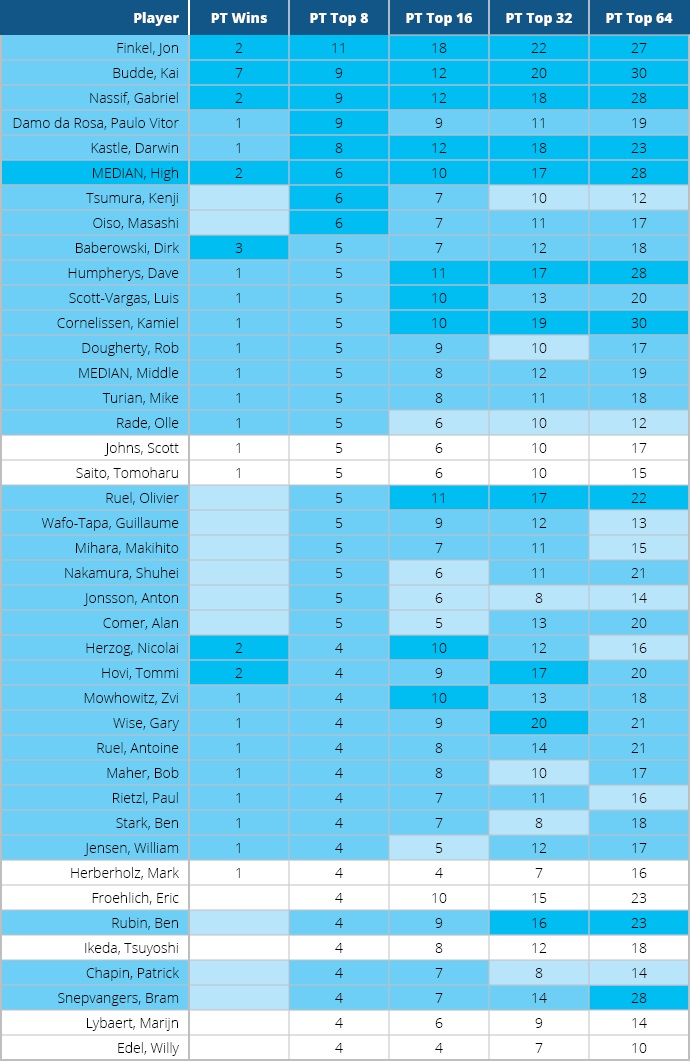
The Top 16 performances:
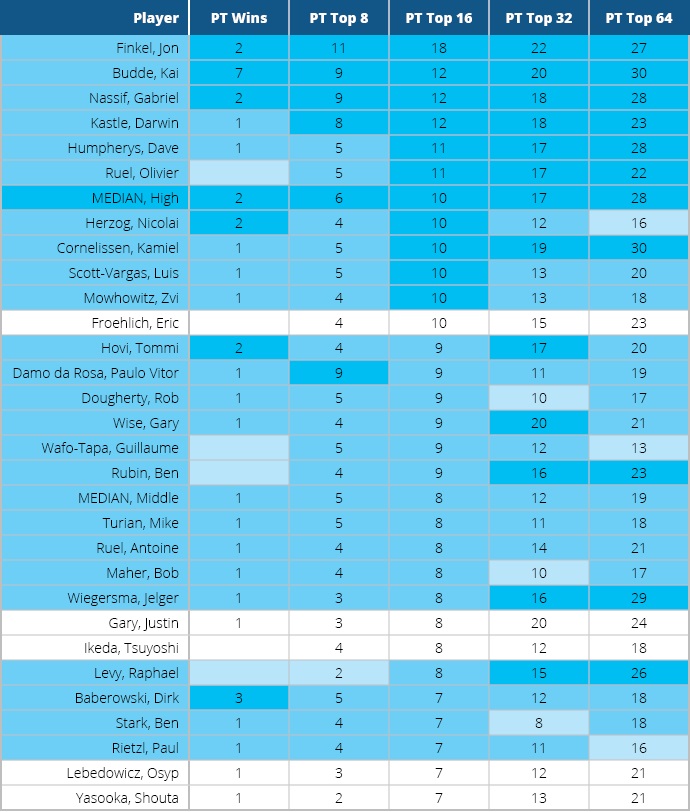
The Top 32 performances:
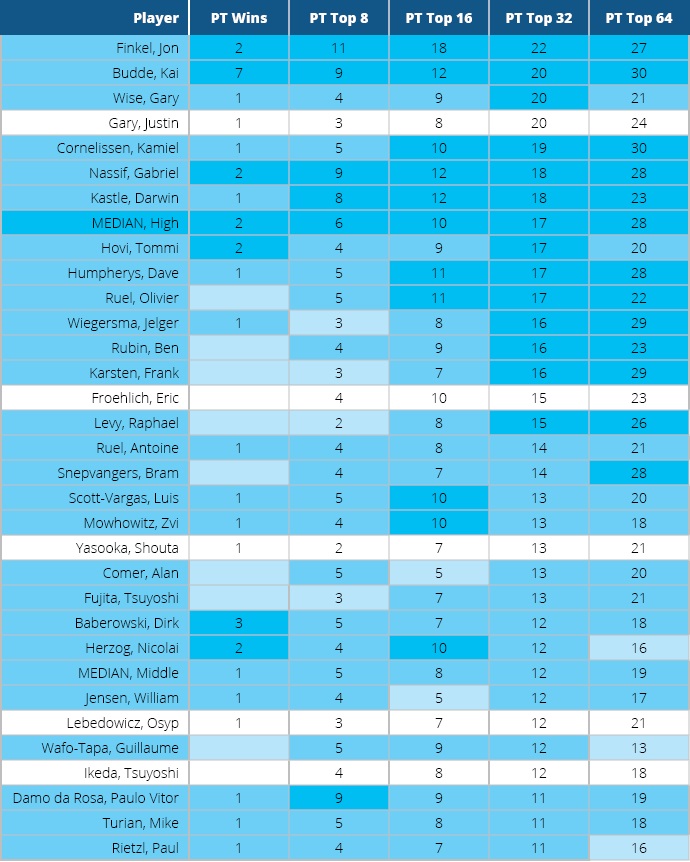
The Top 64 performances:
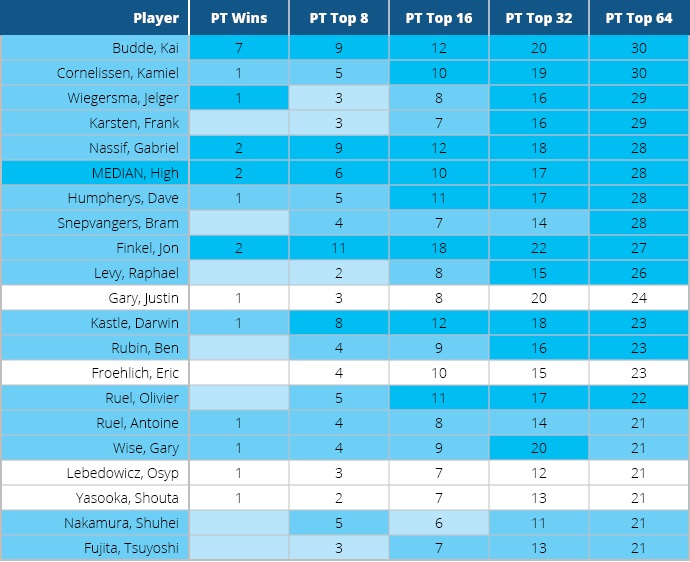
In many ways, this is a list that expresses mastery of the Pro Tour. Only four players manage to make it on at fully four of the above lists (Champion/Top 8/Top 16/Top 32/Top 64):
Eric Froehlich
Justin Gary
Osyp Lebedowicz
Shouta Yasooka
It is also worth briefly mentioning Ikeda, who does have a lot of consistency, as well, but only hits three of the five lists.
Grand Prix
Personally, I don’t put much stock in Grand Prix finishes as a final marker of whether or not someone is deserving of the Hall of Fame. Grand Prix Top 8 finishes and wins are not predictive of the top votes for inclusion in the Hall of Fame. In my mind, these are the extra cherries on the cake, and are a part of the acquisition of PT Points that make people eligible in the first place.
Here are the top GP results, sorted first by GP Top 8 finishes and then by wins:
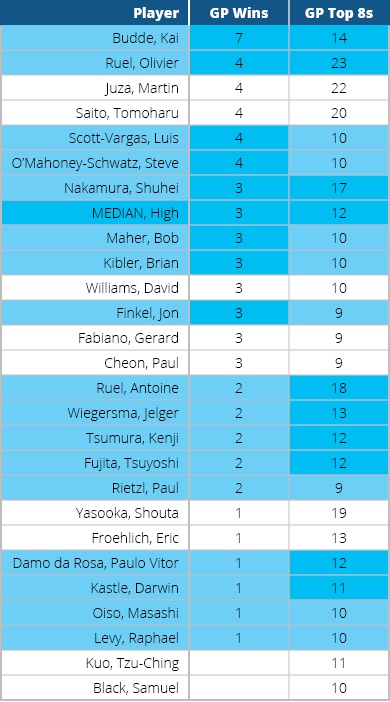
At the top are the following players:
Martin Juza
Tomoharu Saito
They are followed closely by:
David Williams
Gerard Fabiano
Paul Cheon
If Grand Prix results matter to you, these players are the ones to pay attention to.
Total Major Events
This is the part that took the most research. For me, I care about whether or not someone made their National team, how they did at the World Magic Cup, and how they did at the Masters.
To sort this all out, I gave equal weight to being Player of the Year, winning the Pro Tour, Top 4 in the World Magic Cup, a Masters Win, and a Worlds Team Win, and half weight to a Nationals win. Here are how the top of this “Major Event Total” looks:
Ivan Floch is at the top of the nominees (3.5), buoyed pretty strongly by Nationals and Worlds. Shouta Yasooka is right under him (3), with Justin Gary and Tzu-Ching Kuo finish up at the top with 2.5. Underneath that, finally we have Stanislav Cifka (2), like Ivan Floch, buoyed by several Nationals performances.
It’s really worth noting that someone with a strong presence on their Nationals team, like Ivan Floch on this chart, for example, or Will Edel (on the full sheet) really are a major presence in their Magic communities. If this matters to you, you should definitely be keeping that in mind.
My Votes
Like an old man, I am persnickety about my vote.
First and foremost, I want someone who has been around long enough to really know the Pro Tour. Three Pro Tour Top 8 and twenty Pro Tours feels like a reasonable low bar of experience. Out of the 40 candidates, that removes 27 people reducing it to these candidates:
Willy Edel
Eric Froehlich
Justin Gary
Mark Herberholz
Tsuyoshi Ikeda
Scott Johns
Tomohiro Kaji
Osyp Lebedowicz
Marijyn Lybaert
Kazuya Mitamura
Jamie Parke
Tomoharu Saito
Craig Wescoe
The most notable cut, if Pro Tour buzz has anything to do with it, is Shouta Yasooka. Shouta is an incredible competitor, and I imagine I’ll likely vote for Shouta the moment he gets another Top 8. For now, though, he’s a just a little shy of what I want.
Aside from the Top 8, I’m looking for general Pro Tour mastery. One measure of this is being in the Player of the Year race. Here, I see only a small number of players who have been in it at least twice. between Top 8, Top 16, Top 32, and Top 64, I want someone who is consistently above a “Low Median” Hall of Fame member. I think that the Hall of Fame is not only already large, but an incredible honor. I want people who would be excellent candidates. That leaves:
Eric Froehlich
Justin Gary
Mark Herberholz
Osyp Lebedowicz
Tomoharu Saito
This would be a solid ballot, I think, just in general. Let’s address these more closely.
Tomoharu Saito
I cannot in good conscience vote for someone who has behaved like he has in the past. He was DQed for bribery, DQed and banned for eighteen months for unsportingly attempting to trick his opponent into an illegal action, and he was DQed and banned for stalling (Alexander West talks about this well). There is always a lot of talk that this person or that person cheated; for me, I’m going to go with the cold hard facts: were they banned? Saito was banned twice.
Cheating is theft. I would have two more major event Top 8s to my name if it weren’t for cheating. Who knows how that may have impacted my career?
Recently, Saito was at the Super Sunday Series in Seattle, and again, I saw him engaged in unsporting behavior, trying to stall out a game he couldn’t possibly win. The head judge awarded extra turns to the game as punishment, and immediately Saito conceded. He’s still doing what he did to get banned.
No thanks. Not in our Hall.
Eric Froehlich
I’m not voting for Eric Froehlich.
It really boils down to this: he has no major titles. The moment he gets one, he’ll have my vote. Whether it is Player of the Year, a Pro Tour, World Magic Cup – you name it. If I see a title, I’m voting for him.
To me, the Hall of Fame is about more than just high skill. It’s also about the show of the Pro Tour. If someone’s largest accomplishment is a Grand Prix win, that is much less meaningful when we’re talking about them in the promotion of our game. I have a feeling I’ll be voting for Eric in a year or two.
Mark Herberholz, Osyp Lebedowicz, Justin Gary
There are weaknesses to all of these potential inductees. Justin and Osyp only have three Top 8 finishes, and while Herberholz has four, he has a lot of stats that would definitely make him considered a weak candidate.
In looking for ways in which any candidate is an outlier here, Justin Gary stands out to me, as he has for years. When I look at both Osyp’s and Mark’s other accomplishments, they pale:
Justin Gary outstrips both of them on almost every measure, but besides that, he has two additional titles, Worlds Team Champion and US National Champion.
In 2012, I wrote my case for Justin Gary in the Hall of Fame, and every year I’m still of the opinion he is deserving.
My Hall of Fame Ballot
Justin Gary
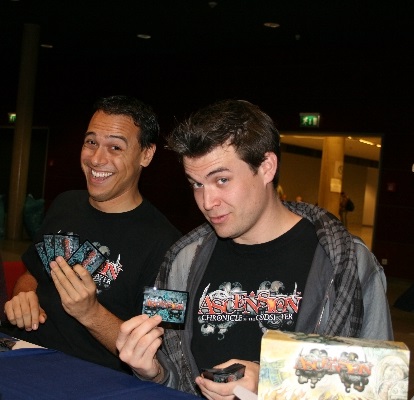
I’ve known him for a long time, and if he makes it in, you can expect that he’ll be playing.
Denouement
One quick note: it takes 40% of the votes to make it to the Hall of Fame. I’ve always felt like players who are close to making it should be re-introduced to the community with an invite to the Pro Tour if they don’t already have one. For a lot of people with ballots, they’ve simply never even interacted with many of these players, and if they could, perhaps it would influence them one way or the other.
There are a lot of ways to look at who should be in the Hall of Fame. I hope the data I’ve gathered makes your own inquiry into the subject all that much easier.


